I am sure for many of you the churlish man with the shrouded eyes, enveloped in the smoke of his cigarette needs no introduction. You have lived his life with him, walked his path, and made the choices for him that made him either light or dark in how others perceive him.
For the rest of you, that is Arthur Morgan from Red Dead Redemption 2. It is a massive game with an internally built morality rating system or honor level that you will get either rewarded for having a high honor rating or punished for having a low one. These rewards or punishments come in different flavors, such as townspeople wanting nothing to do with you, or remembering you fondly, paying higher or lower prices at stores, among other things.
Arthur also changes based on how you play him, but we will get to that. First, you have to have a bit of an understanding of the game, and the character. Red Dead Redemption 2 (RDR2) is a game that takes place at the end of the wild west era. It is 1899, and you play Arthur Morgan, the number three man in a gang of thieves who range in expertise from gunner to straight conman. Arthur has lived this life since he was a kid.
The gang is on the run from a robbery that went sideways. The entire game is based around ducking and weaving from the law, the fallout from the job, and trying to make that last score in order for the gang to finally retire. While playing Arthur, you are fully engulfed in his life, and as I mentioned you make decisions that will affect the game's progress and outcome. The ultimate outcome is determined by your actions, and it can either be dark and lonely, or melancholy but bittersweet. That is up to you.
When you engage in a game like Red Dead, you are stepping into the life of someone else. You are taking on their mantle, and trying to find your way through their problems. Arthur has a plethora of problems, and you can choose to make those problems mountains or molehills. You also will change Arthur as you guide his actions.
Arthur is always going to be a man that drinks far too much, a criminal, and a murderer. However, from there you can decide if he is loyal. If the things that he does do to others are for necessary effect or the sheer delight of the action You can decide if he is, at heart, a decent person, or someone the earth would be well rid of.
Something that I have found when playing games with neurotypicals, or simply watching them, is that there is a serious divide between how I approach moral choices in a game, and how they do. When I play Arthur, he is as bad as he has to be. No worse, and certainly not looking for a fight. I play Arthur as though I am Arthur. His choices in the game are what my choices would be in life. I will do what has to be done, but that is the extent of it.
Neurotypicals, on the other hand, revel in being able to do some truly awful things. The thing about RDR2 is that you can more or less do anything. You can throw a stick of dynamite into a church service if you so choose. In fact, you are so able to do anything that you wish in the game, there are almost no NPC children outside of a character that is the child of two gang members. So long as there are almost no children, no one can complain about players doing awful things to children in the game, and posting the videos on YouTube. They even made it so the few kids in the game, aside from one apparently, are invincible.
Why would they do that? Because people will, absolutely and without a doubt, do terrible things to the kids in RDR2, post it all over the internet, and think that it’s funny. I know this because every character that can be accosted and dragged behind a horse, blown up, thrown off a cliff, hung, stabbed, shot, or any other myriad way of being slaughtered, will be so, and it will be available to view on YouTube.
This is contrary to how I game because it is contrary to how I think. I wouldn’t blow people up because I see no value in that action. It is something that I don’t get any pleasure out of in life, so why would it be any different in a game. This leads up to the question of why it is such an attraction for NTs to do, and I believe that I have an answer. It is because nothing is stopping them. They don’t have to worry about prison, being socially disowned, there is no guilt, no reason to feel empathy for an NPC, and they can rationalize it because, in their minds, the characters aren’t real. It’s not like they can feel fear, pain, it isn’t as though they can suffer. Why can’t they do whatever they want?
This always vexed me a bit. It tells me that the reason that many people aren’t doing some of these things in real life is that they know that there will be consequences. Remove the consequences, and where does that leave them? Indulging in their darkest inclinations. They get to see what it’s like to blow up a KKK rally or attack an entire town for no reason whatsoever. They get to see what it’s like to just start shooting random strangers, rob them, dump their bodies in the river, and hope that you don’t catch a bounty.
Moral choices in a game aren’t much different than moral choices in real life to me. This isn’t to say that I am some morally superior being, and you could almost argue a bit of the opposite I think. I don’t have the same concerns about being socially disowned, and yes there are consequences, but I don’t have the emotional drawbacks to acting in the way that NTs do in a game, in real life. Is it because I don’t want to go to prison? Partially, but a lot of it comes from, there isn’t anything in it for me in real life, and there isn’t anything in it in the game for me either. I play the game the way I play life. I look for the best advantage for me, look for any openings I can, and take advantage to put myself in the best position.
As such, I play the game using some nice game glitches that you can take advantage of, provided you have a first press copy of the game.
Something that I was considering recently when writing my simulation post, was this. If we have no idea whether or not this is base reality, how are we so certain that this is not a game? How do you know you aren’t a character in a game that is subject to all the same hangups that someone else who is getting to step outside society might have? How do you know that the people in prisons just had people playing their lives in a very dark way, only to shrug, and start a new character when criminality got boring? How do you know you aren’t a Sim?
Extending that a bit, how do you know that RDR2 is not a game within the game? How do we know that the characters within it aren’t just like us, living in a constructed reality, subjected to the wills of another reality playing the same cycle over and over? If that were true, wouldn’t they be just as capable of suffering as anyone else is? I would imagine so. Would that change how people played the game?
It would certainly be interesting. That would insert back into it the emotional consequences, but not the physical ones such as prison. Would that stop most people? Probably not would be my guess. They wouldn’t have a connection to that person that they are deciding the fate of. They can’t talk to them, can’t relate to them at all, so no empathy would be present. It’s not much different than how humans act towards others that they do not have those connections to. So long as they aren’t feeling anything particular for that person, then why would they stop doing something that they have determined to be fun? I would bet, they wouldn’t.
I have talked to many NTs about this, and it is weirdly a subject that they can get quite defensive about. It isn’t an indictment of who they are as a person in my mind. I am simply questioning whether or not their actions or inactions in life are because of reasoned thought, or fear of mental and physical repercussions. I have already had this debate with myself, and I figured out a long time ago that the results of my actions can be more costly than they are worth, and the best way for me to get through in life is to make the least amount of trouble for myself.
However, I have also spent a fair amount of time deciding why I don’t engage in certain activities. This circles back to the golden rule post that I made, and the saying that I live by.
Treat me well, and I will treat you better. Treat me poorly, and I will treat you worse.
There is nothing in my life emotionally that prevents me from doing whatever I want, which means that the things that I do, are because I want to, or because I have weighed the cost-benefit analysis, and there is a net gain on my side of the ledger due to those actions. That is my concern. Cost me little, benefit me greatly, cause me minimal problems. This translates over directly to my gaming as well. How it is in life, it is in fantasy.
It is an interesting dichotomy that exists between neurotypicals and psychopaths. it is a clear divide with how things are thought of. On one side there is no limit to action, so all action is considered for the worth of that action, the benefit of that action, and the cost of that action. On the other, there are very clear lines that cannot be crossed in society. They come with steep prices, cause a great deal of emotional and physical pain, and they will result in questioning the very person that they thought that they knew themselves to be. That is until they are freed from many of those consequences, and the rest can be rationalized away.
Fascinating. Or, it is to me at least.
All right you RDR2 fans that read this far and want to know how to cheat the system. I’ve got you covered. I can only attest to this working with a first print of the XBOX One game. I don’t have any of the others, and no it won’t work on the PC version, but there are so many mods for that one, you really don’t need the help.
Anyway. First things first, make sure your saves are backed up on the cloud. If you don’t do this, I don’t know what to tell you. Just don’t come crying to me if you accidentally remove all of your progress.
Next, uninstall the game from your system entirely.
Now, take your console offline. Completely and totally offline. You do not want the game to download its updates.
Reinstall the game.
Now, start the game, and play through until you get to the point that Hosea wants to go rip off the stagecoach for the guy at Emerald Ranch. You need the fence to be open for business. Don’t go picking up any tidbits like the gold bar in the burned-out town just down from camp. You want those to still be there.
Having done that, save your game and head to Limpany. If you don’t remember where that is, and it isn’t on your map yet:
That place, go there, but don’t go into town yet. Stop outside, and take a moment to familiarize yourself with where you have to go. You will be looking for the sheriff’s station:
And specifically the box under the counter:
Now, time to loot thirty gold bars. Yes, you read that right, thirty. Which can in fact, sometimes be doubled. Here are the exact steps to follow.
0. Turn Off auto-save - settings - general
1. Save outside of town just for a backup.
2. Ride in
3. Pull out the box and open it.
4. The pamphlet must be in the box. If so, it will work, if not, the glitch won't.
5. DO NOT SAVE
6. Focus on the gold bar, and pick it up, leave the pamphlet alone
7. As you bend over, pause it as he is bent over before he picks it up (do not wait for the icon, it will be too late)
8. Make a new, fresh save (do not overwrite)
9. Immediately hit back, then click on load, and reload the save you just made.
10. Return to the town and the lockbox, the pamphlet should be gone and the gold bar in the box alone
11. PUSH & HOLD the pick-up button, it will allow you to pick up gold bar after gold bar until you can carry no more.
12. Go to the fence at Emerald ranch and sell the gold bricks.
13. Return to just outside the town and make a save, just in case
14. Go back to the lockbox
15. DO NOT SAVE & attempt to pick up the bar again
16. As you bend over, pause it as he is bent over, before he picks it up (Do not wait for the icon, it will be too late)
17. Make a new, fresh save (do not overwrite)
18. Immediately hit back, then click on load and reload the save you just made.
19. Return to the town and the lockbox, PUSH & HOLD the pick-up button until you can carry no more.
20. Repeat.
If you did it right, you now have a LOT of money. Now, what about an awesome horse? Say no more, head to San Denis. You are looking for this ranch:
Once you are there, save your game, then pull out your binoculars, and inspect the horses there. This spot will spawn every single horse in the game except the white Arabian. You can get that for free anyway, so you don’t need it.
When you inspect the horses, if there isn’t one that you want, reload the game, and try again. Keep trying until you hit paydirt. You may have to reload several times to get the horse that you want, and yes, you can do this until you fill your stable. However, you have to do the next step, or the stable will consider it a “stolen horse”.
When you see the horse you want, walk over to it, and start making friends with it. Pat it, talk to it until the horse hits bonding level one. Once it has, slap your saddle on it, and ride away with your old horse in tow. No one will stop you, and you can repeat this until you have every horse that you want. Just ride into San Denis and stable it, then go back, and do it again. Sometimes the stable in San Denis won’t open for you at this stage, it’s rare but does happen. just head to the next nearest one that you know is open, then return.
After you have the gold you want and the horses that you want, you can put your console back online, and do all the updates. You will keep all your fun stuff. If you are really smart, you will make multiple saves that you can start from that has all your fun toys, so you can play through as many times as you want without having to redo any of this process. It can be a bit tedious, but it’s worth it. Now you can play RDR2 without ever having to worry about money. It’s quite fun.
A quick tip, do not go to pick up the semiautomatic shotgun from the Watson's Cabin. If you do, you can’t clean it up. It will always be in poor condition in your inventory. You have to put the game back online before you can grab it. Take it from me, who made the mistake of getting it early, and having to reset. It was a bit of a pain.
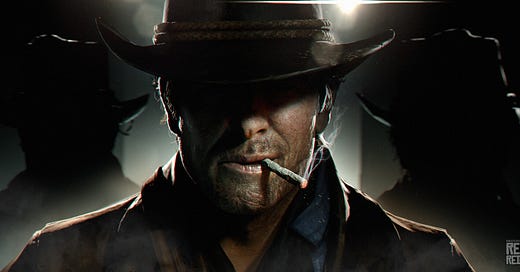




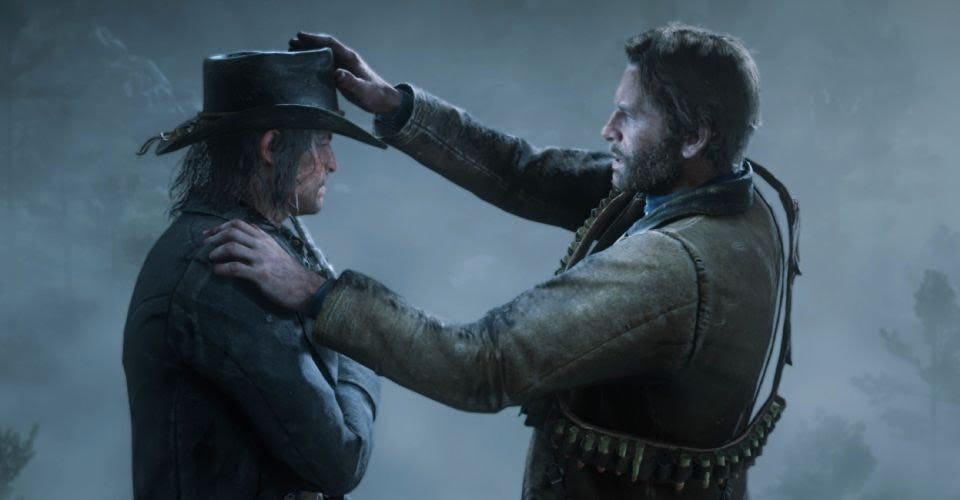
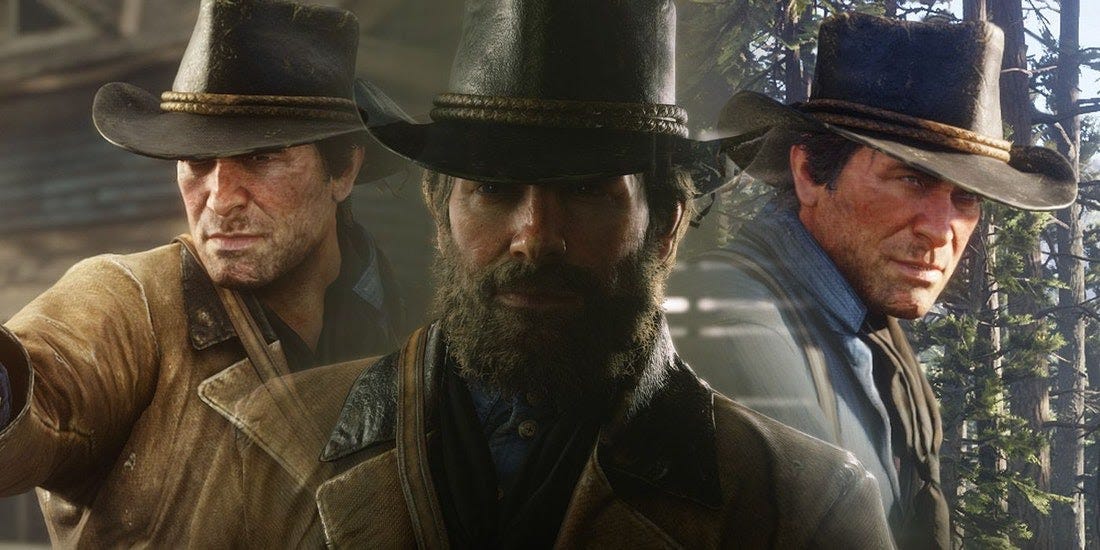
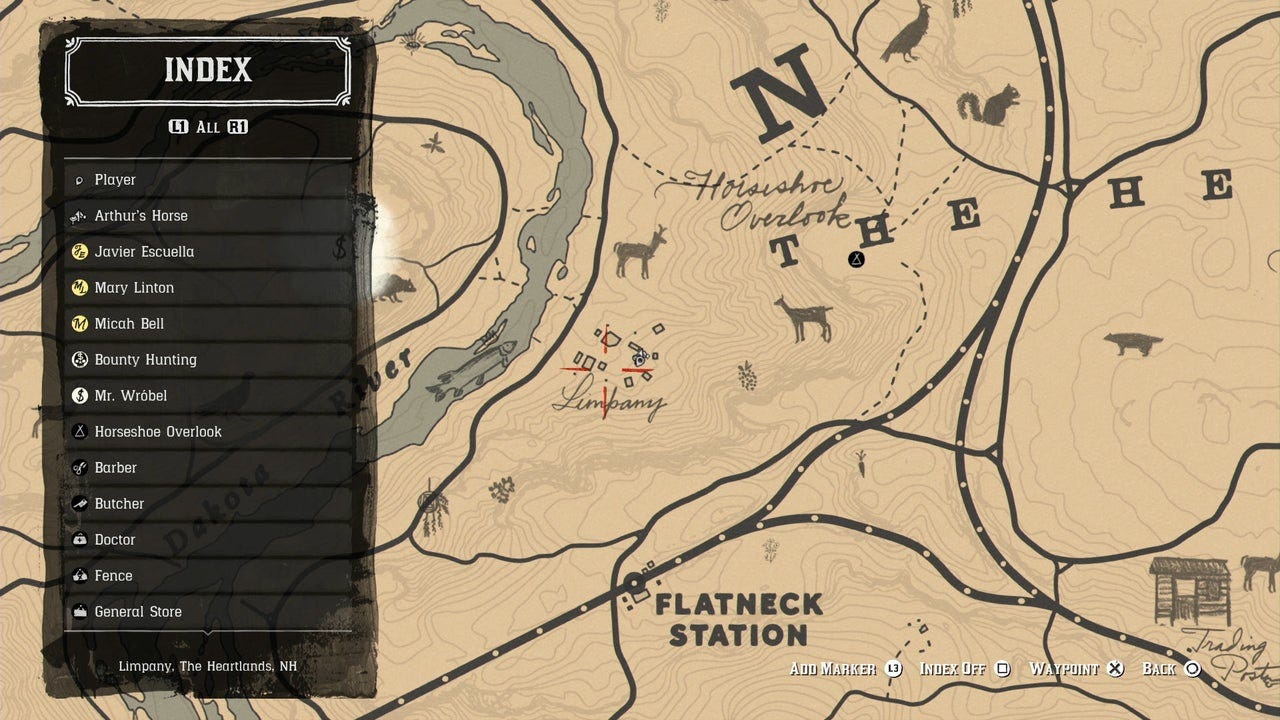
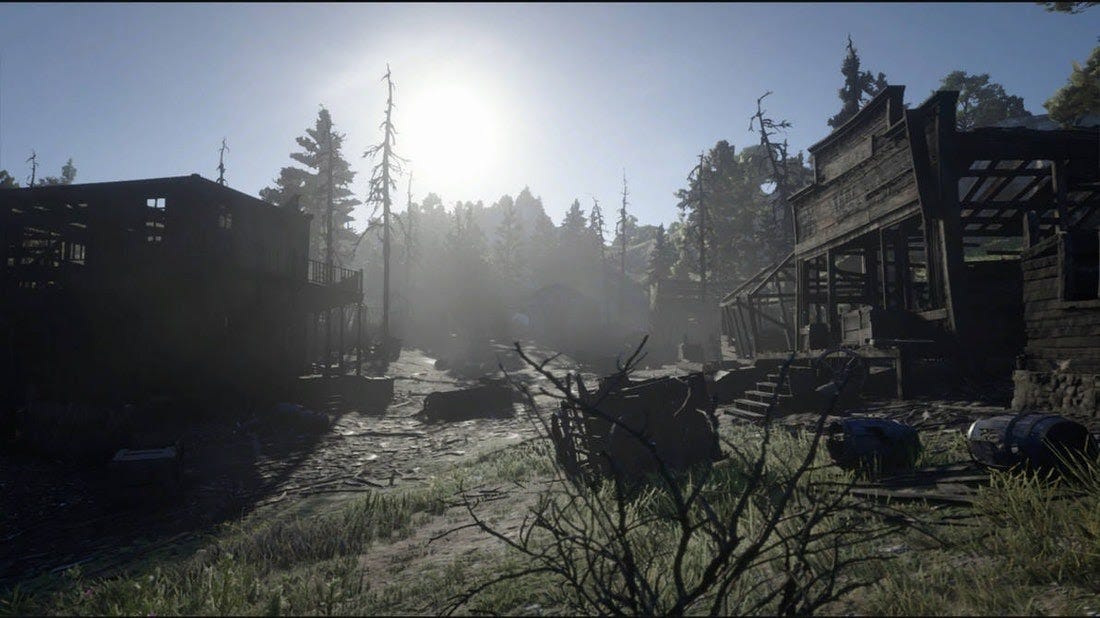
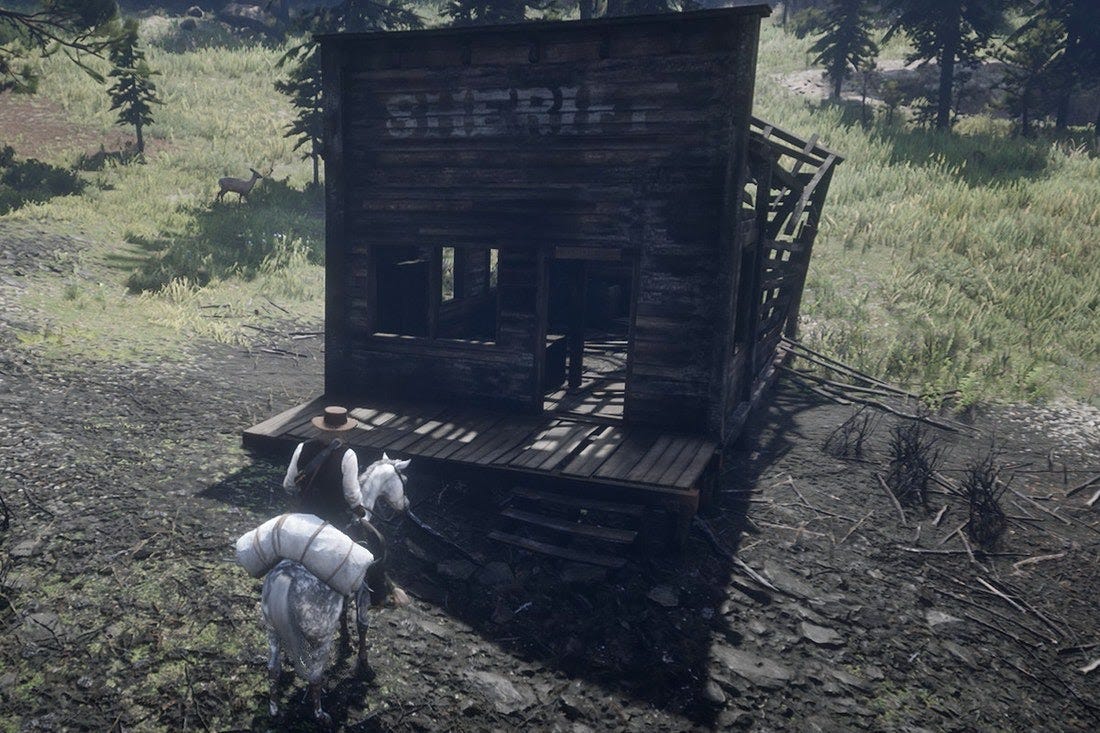
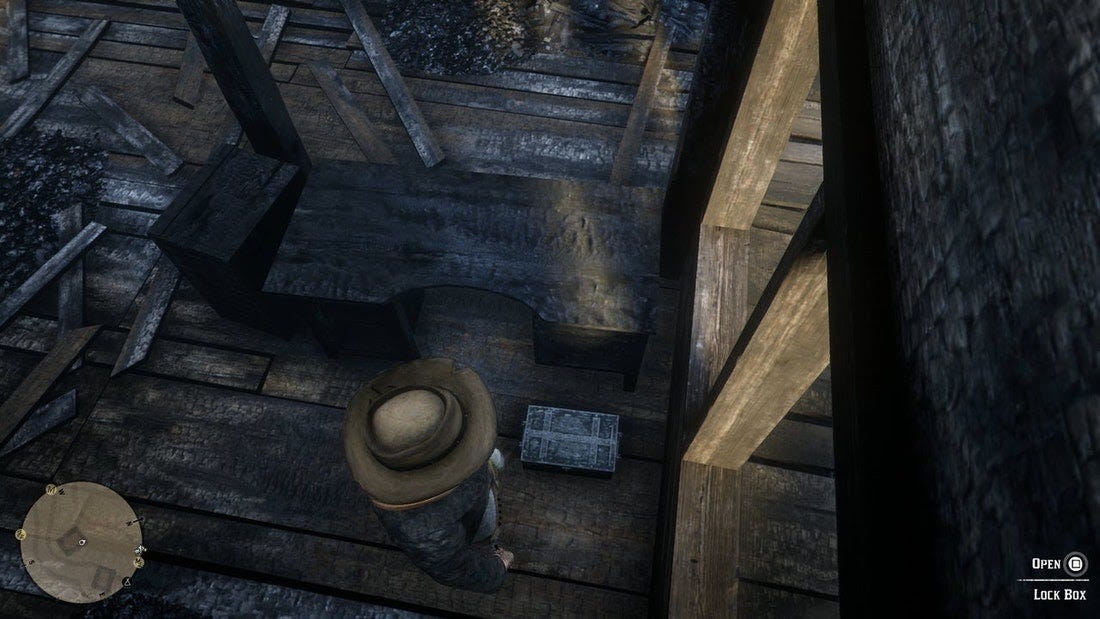
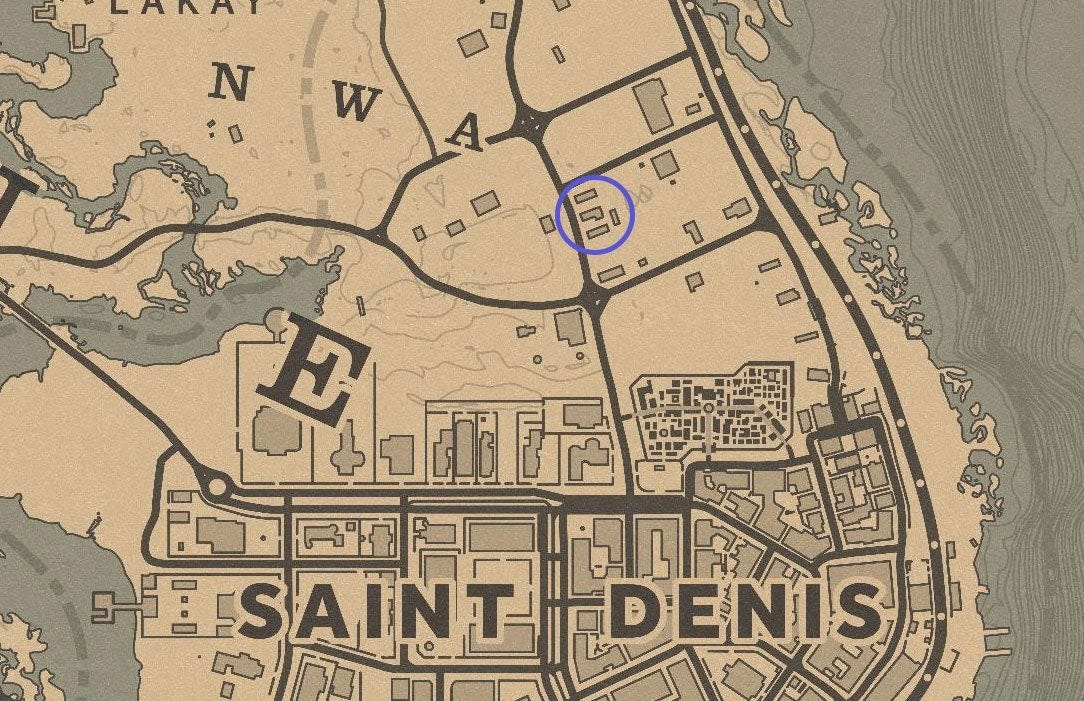
The way you describe yourself playing has a name: self-insert. Some NTs like to play self-insert. But there are many who consider self-insert less interesting. After all, the game itself is a fantasy, so the character can be one, too. There is also replay value in going back and making different choices.
I haven't played RDR2 (yet), but I remember when KOTOR (Knights of the Old Republic) came out. You can make "light side" or "dark side" choices, and you get specific power boosts if you max out either end of the spectrum. At first I played a light side hero, because that's what came naturally. But as the game progressed, I enjoyed the flavor of the dark side powers more. (C'mon, what's cooler? Stun… or LIGHTNING?) So I decided to build up dark side points. The next quest I did was a side quest where a woman needs money desperately, and all she has of value is this plate that her late husband had. She wants you to sell it for her. But I just took it from her and gave her nothing. She reacted with misery, saying "it's all we had, now we have nothing and we're stuck here." I felt bad. Surprisingly bad. It was just a fictional action I did to a fictional character, but it was to the degree that I thought, ugh, I can't make myself play dark side. I was too much of a softie to even pretend.
Equally surprising to me was how fast I got over it. I didn't feel nearly as bad at the next pretend evil action, and after a few I didn't feel bad at all! Actually it got to be funny, in part due to the absurdity that "I" would do such things. I also loved how my character's face got all gray and distorted.
The whole experience made me think about how deeply empathy is wired into most of us… but also about the mechanisms for overriding it. I mean, there are circumstances where empathic emotions would really get in the way if there wasn't a way to reduce them. Killing and maiming other humans in a war. Giving calm medical assistance to someone screaming in agony. Punishing people who break the law. I really am a softie, so if for instance I think about someone in some shithole prison, it's a very unpleasant feeling. But then if I know they committed some heinous crime, it's like Empathy-B-Gone, suddenly I don't care anymore. (Well, it's a bit more complicated than that, but that's the gist.)
Maybe that's what allows NTs who do evil things IRL to rationalize away guilt or other bad feelings they might otherwise have?
There are lots of reasons I don't do evil things IRL. Sure, when I was a little kid, it was just about the consequences, emotional or otherwise. But over time that changed (presumably because my brain developed). So now in addition to consequences there's a bunch of "higher-level" abstracts involved. A sense of justice. Seeing myself as "a good person," whatever that means. Enlightened self-interest. (Good thing, too, because there is surely a lot I could get away with if I were really motivated to.)
Fiction, though, that's different. This type of game is storytelling. Personally, I want to see everything the writers came up with (assuming the writing is good). If there are multiple endings, I go back to trigger each one. I make different characters based on different concepts, with different appearances. Let's see what happens if I say this or say that. What happens if I attack this guy? What happens if I let my character starve? If I really like a game, I want to see where all the boundaries are.
How do we know that characters in RDR2 are not capable of suffering?
Think about why a person would feel pain if they do something like step on a thumbtack. They only feel it because there is a mechanism -- nerves that fire in response to the injury and transmit the signal to their brain, which then processes it in various ways that results in their experience of pain. If the mechanism is blocked, for example if their foot is anesthetized, then they will not feel that pain -- it's not possible. They could still *act* like they did, but then it would only be a simulation.
RDR2 does not have mechanisms for pain or suffering. The inputs are a mouse/keyboard/controller signal that maps to one of N number of choices at a given point in the game. These in turn map to different parts of the script, which the computer uses to select which content to draw on the screen and output to the speakers, as well as which flags to write to memory. The computer does not have a way to make any other distinction.
There are no pathways inside the computer by which the choices alter or otherwise affect the functioning of the computer. It has no processing to recognize things that are "good" or "bad" for it. No place in memory where anything like that is represented, stored, or retrieved. No social context, experience, or ability to make predictions about its future. No consciousness. Suffering cannot take place.
Do I believe that in the future we might build machines/programs that are conscious, self-aware, and capable of joy or suffering? Sure, but we are a long ways off. We're not exactly in Westworld yet. There might be some question as to whether the Westworld androids can suffer or not, but they do demonstrate that they have the prerequisites. And because of that, I think it would NOT be okay to mistreat them. But characters in RDR2 can only suffer in our imaginations.
Anyway, fascinating for sure, and it was cool to read your perspective on it.
Book (series) recommendation for yah, which made me suddenly remember this post: NPCs, by Drew Hayes. (The series that continues on from that is called 'Spells, Swords, Stealth'.) The basic premise is that the story is told from the POV of NPCs from a D&D style game, who are forced to take over for some dead player characters. There's interaction between the NPCs and the players in various interesting ways, including the players being called to account for how they treat NPCs in general.
Oh, and Drew Hayes is also just a really good writer. This is the third time I'm re-reading this particular series, and I've managed to stay up till 2:30 am yet again reading it. (Book 5 comes out soon! Yay!) He even got me to read a series about super heroes (Super Powereds), which is a theme I'd normally never even think to read about.